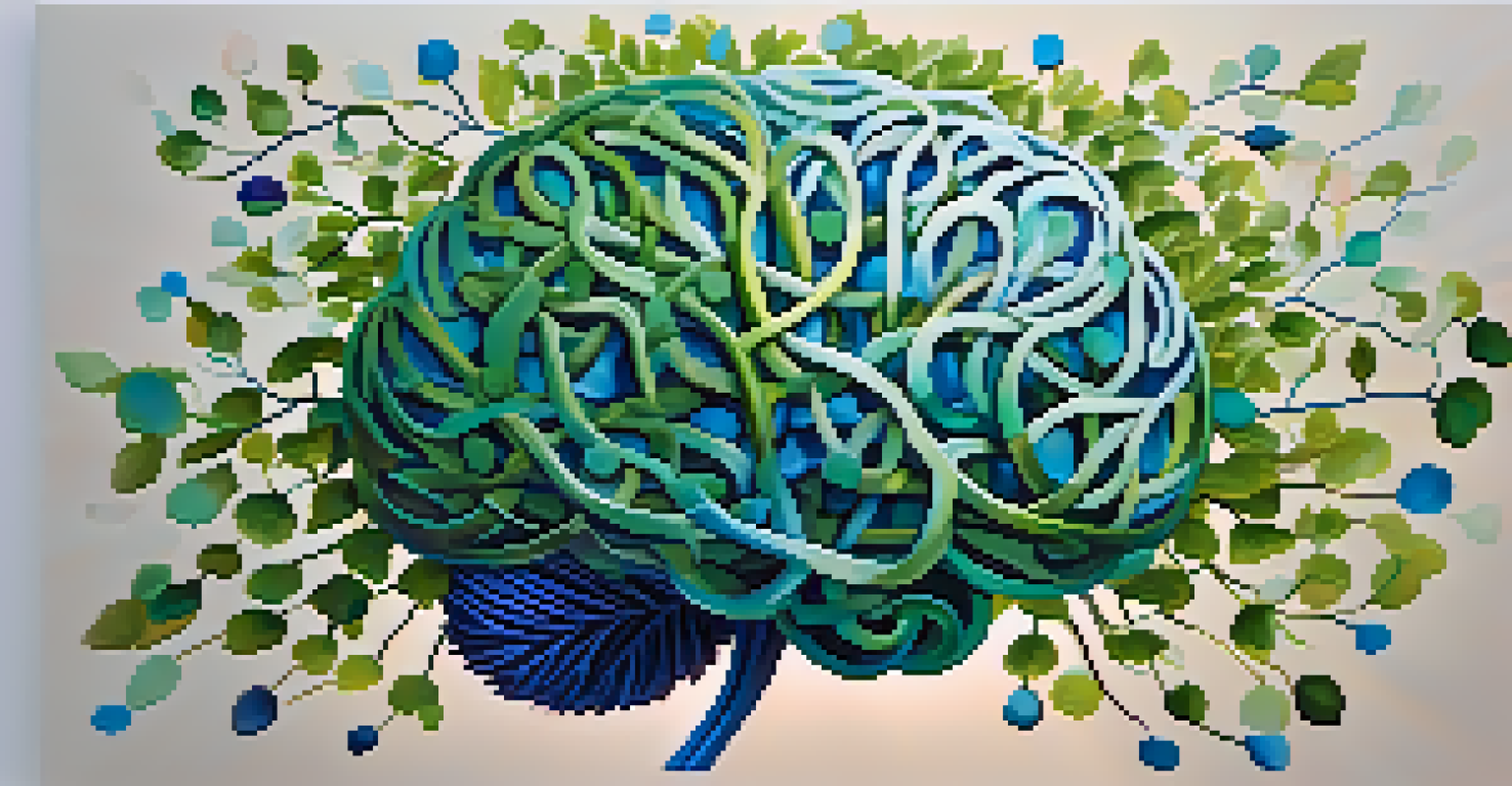Cultivating Emotional Intelligence for Holistic Health

Understanding Emotional Intelligence and Its Importance
Emotional intelligence (EI) refers to the ability to recognize, understand, and manage our own emotions while also empathizing with others. This skill is crucial because it impacts how we interact in personal and professional relationships. By nurturing EI, we enhance our capacity to communicate effectively and resolve conflicts peacefully, which is essential for holistic health.
Emotional intelligence is the key to both personal and professional success.
In essence, EI acts as a compass that guides our emotional responses, helping us navigate life's challenges with greater ease. Imagine trying to steer a ship without a map; similarly, without EI, we may find ourselves lost in a sea of feelings. By cultivating this skill, we can chart a course toward healthier relationships and improved mental well-being.
Moreover, studies have shown that high emotional intelligence correlates with better stress management and greater resilience. When we understand our emotions, we can respond thoughtfully rather than react impulsively. This leads to a more balanced life, where emotional well-being is prioritized alongside physical health.
The Connection Between EI and Physical Health
Emotional intelligence doesn't just influence our mental state; it also plays a significant role in our physical health. Research indicates that individuals with higher emotional intelligence often experience lower levels of stress and anxiety, which can lead to a stronger immune system. When we manage our emotions effectively, we reduce the risk of stress-related illnesses like heart disease.

Think of your body as a finely tuned instrument. Just as a musician must understand their instrument to produce beautiful music, we must understand our emotions to maintain our health. By practicing EI, we can ensure that our 'instrument' remains in harmony, leading to improved physical vitality.
Emotional Intelligence Boosts Health
Developing emotional intelligence leads to better stress management and improved physical health.
Additionally, emotional intelligence encourages healthier lifestyle choices. When we are aware of our emotions, we're more likely to engage in activities that promote well-being, such as exercise and balanced nutrition. Thus, cultivating EI is not just about emotional wellness; it's integral to fostering a healthy lifestyle overall.
Enhancing Relationships Through Emotional Intelligence
One of the most profound benefits of emotional intelligence is its ability to enhance our relationships. When we understand our own emotions and those of others, we can communicate more effectively and foster deeper connections. This creates a supportive environment where individuals feel valued and understood.
The greatest ability in business is to get along with others and influence their actions.
Imagine having a conversation where both parties truly listen and empathize with each other. This is the power of EI in action. By developing this skill, we reduce misunderstandings and build trust, which is the foundation of any healthy relationship, whether it's with family, friends, or colleagues.
Moreover, strong relationships can act as a buffer against stress and mental health issues. When we have a solid support system rooted in emotional understanding, we are more resilient in the face of challenges. Thus, investing in emotional intelligence is an investment in our social well-being.
Practicing Self-Awareness for Better EI
Self-awareness is the cornerstone of emotional intelligence. By recognizing our own emotions and understanding their triggers, we can develop a greater sense of control over our reactions. This not only helps in managing stress but also enhances our overall emotional health.
Think of self-awareness as a mirror reflecting our emotional landscape. When we take the time to look inward, we can identify patterns in our behavior and make conscious choices. This practice enables us to respond to situations with intention rather than impulse, leading to healthier outcomes.
EI Enhances Relationship Quality
High emotional intelligence fosters deeper connections and trust in personal and professional relationships.
Incorporating mindfulness techniques, such as meditation or journaling, can significantly boost our self-awareness. These practices encourage us to pause and reflect, giving us the clarity needed to navigate emotional challenges. Thus, self-awareness paves the way for developing a robust emotional intelligence.
Empathy: The Heart of Emotional Intelligence
Empathy, the ability to understand and share the feelings of others, is a vital component of emotional intelligence. It allows us to connect on a deeper level and respond compassionately to those around us. By practicing empathy, we create an environment where emotional healing can thrive.
Imagine walking in someone else's shoes—this simple act of understanding can transform our interactions. When we empathize, we validate others' feelings, making them feel seen and heard. This connection fosters trust and strengthens relationships, essential for holistic health.
Moreover, empathy can lead to greater social harmony. When we approach situations with an empathetic mindset, we are more likely to resolve conflicts peacefully and promote mutual understanding. In this way, cultivating empathy enriches not only our lives but also the lives of those around us.
Building Emotional Regulation Skills
Emotional regulation refers to our ability to manage and respond to our emotions in a healthy way. This skill is crucial for maintaining balance in our lives, as it helps us cope with challenging situations without becoming overwhelmed. By developing emotional regulation, we can navigate ups and downs more effectively.
Think of emotional regulation as a thermostat for your feelings. Just as a thermostat keeps a room at a comfortable temperature, emotional regulation helps us maintain emotional balance. It allows us to cool down during heated moments and warm up when we need motivation.
Self-Awareness is Key to EI
Practicing self-awareness helps us understand our emotions, leading to better emotional regulation and healthier interactions.
Practicing techniques such as deep breathing, positive self-talk, or visualization can enhance our emotional regulation skills. These strategies empower us to respond thoughtfully rather than reactively, leading to healthier emotional outcomes and overall well-being.
The Role of Emotional Intelligence in Holistic Health
Ultimately, cultivating emotional intelligence is essential for achieving holistic health. When we integrate emotional, physical, and mental well-being, we create a more balanced and fulfilling life. EI serves as the glue that holds these elements together, promoting harmony within ourselves.
Consider holistic health as a garden; every aspect—mind, body, and spirit—needs care and attention to flourish. Emotional intelligence acts as the gardener, nurturing our emotional landscape and allowing all areas of our lives to thrive. Without it, some areas may wither while others flourish, leading to imbalance.

By prioritizing emotional intelligence in our daily lives, we not only enhance our own well-being but also contribute positively to our communities. A society built on emotional understanding is one where individuals can thrive, fostering resilience and health for everyone involved.